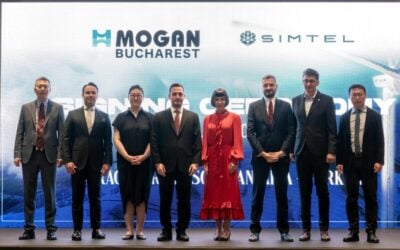
The European Union (EU) has launched the Clean Industrial Deal and Affordable Energy Action Plan, which dedicate at least €100 billion towards boosting industry, manufacturing and speeding up the rollout of renewables and energy storage.
The EU’s executive body the European Commission presented the Clean Industrial Deal and, within it, the Affordable Energy Action Plan, yesterday (25 February). The former is more focused on manufacturing and industry, while the latter focuses on the energy sector and getting more clean energy online, and has more relevance for the stationary energy storage industry.
Enjoy 12 months of exclusive analysis
- Regular insight and analysis of the industry’s biggest developments
- In-depth interviews with the industry’s leading figures
- Annual digital subscription to the PV Tech Power journal
- Discounts on Solar Media’s portfolio of events, in-person and virtual
However, the Clean Industrial Deal is considering ways in which procurement will have non-price criteria to boost local clean energy manufacturing including batteries. Just last week, at the Energy Storage Summit EU 2025 in London, the CEO of European firm Elinor Batteries told us that Europe would need such criteria or incentives for locally-produced products for the battery industry to be competitive.
Clean Industrial Deal considers ‘made in Europe’ criteria for procurement, black mass measures
The Clean Industrial Deal aims at its core to help energy-intensive industries to decarbonise and ‘tackle unfair global competition’, boost the cleantech sector, increase circularity within European industry, help its workforce adapt to a clean energy economy and boost clean energy manufacturing. It is related but separate to the bloc’s Net Zero Industry Act (NZIA), which specifically targets clean energy manufacturing.
It will mobilise over €100 billion (US$105 billion) to support EU-made clean manufacturing, via new and improved state aid frameworks, strengthening its Innovation Fund, and launching a new proposed Industrial Decarbonisation Bank.
The Commission is also considering ‘non-price criteria for sustainability, resilience as well as EU
content requirements’ for public procurements, and similar requirements in private procurement too. Batteries were mentioned as an example technology.
Another relevant section for the battery industry is the Commission’s plan to adopt specific measures regarding ‘black mass’ to stop it leaving the continent. Black mass is what you get from shredding end-of-life batteries, to then separate them into battery metals for reinsertion into the battery supply chain. But that process is expensive and little capacity to do it exists in Europe.
Measures ‘cannot wait for next long-term budget cycle’
Diego Pavia, CEO of EIT InnoEnergy, an innovation ecosystem within the EU, said on the Clean Industrial Deal: “However, this must be complemented by further mobilisation of private capital to meet the volumes required to scale clean tech. Time is of the essence to develop new financing instruments. The EU cannot afford to wait for the next long-term budget cycle to finance these new initiatives.”
Trade body The European Association for Storage of Energy’s (EASE) senior policy officer Aurélien Ballagny’s meanwhile commented:
“The Clean Industrial Deal is a step in the right direction for energy storage deployment. However, we encourage the Commission to acknowledge that energy storage solutions do not stop at batteries and hydrogen. They are in fact a wide-range of technologies to address different challenges.”
“The Clean Industrial Deal identifies the quick implementation of existing legislation as a priority. EASE fully supports this as many EU provisions not yet transposed address obstacles to energy storage, such as lack of access to energy market, high taxation & fees, or a lack of remuneration for services to the grid”.
Affordable Energy Action Plan to speed up renewables, storage, energy efficiency
As part of the above, the Commission presented its Affordable Energy Action Plan. The Plan aims to bring down electricity costs, increase energy efficiency, increase security of supply and preparedness for another price crisis (like 2021’s).
The EU’s industrial retail electricity prices are higher than those in China and the US, and the difference has increased substantially since 2019, although lessened in 2024.
A big part of narrowing this gulf will be by ensuring EU, national, regional and local authorities make a major effort to accelerate the permitting procedures for grid, storage and clean energy projects. Part of that also needs to be simplifying and shortening permitting procedures for environmental impact assessments for such projects, it said, while still maintaining environmental safeguards and protecting human health. The Commission will put forward legislative proposals to achieve these, it said.
The Commission also wants the EU to increasing system flexibility by deploying storage and demand response, by implementing EU rules on market access for storage and demand response to remove national barriers. This includes things like ‘double charging‘ on grid fees for storage.
However, in her comments, trade body SolarPowerEurope’s CEO Walburger Hemetsberger gave the view that a strategy around battery energy storage system (BESS) technology is lacking.
“Getting the upcoming Grids Package right is critical to the success of the competitiveness agenda. It should be a Grids and Storage Package. Battery storage is the absolute shortcut to lower, less-volatile energy prices. Where is Europe’s battery storage strategy?”, she said.
See the Commission’s full outline of the Clean Industrial Deal plan here, and the Action Plan for Affordable Energy here.






